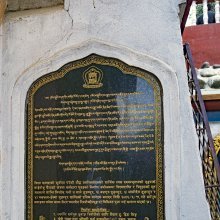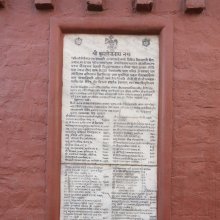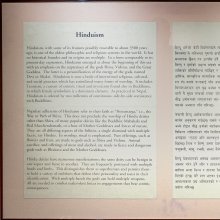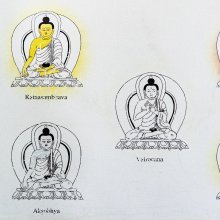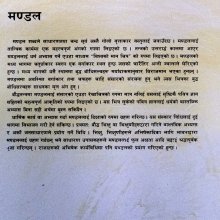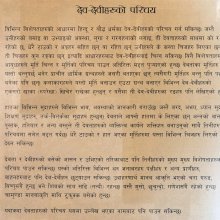Dharmika, Dhārmika: 17 definitions
Introduction:
Dharmika means something in Hinduism, Sanskrit, the history of ancient India, Marathi, Hindi. If you want to know the exact meaning, history, etymology or English translation of this term then check out the descriptions on this page. Add your comment or reference to a book if you want to contribute to this summary article.
Alternative spellings of this word include Dharmik.
Images (photo gallery)
(+1 more images available)
In Hinduism
Purana and Itihasa (epic history)
Source: archive.org: Shiva Purana - English TranslationDhārmika (धार्मिक) refers to “virtuously (ruling over one’s kingdom)”, according to the Śivapurāṇa 2.3.34 (“The Story of Anaraṇya”).—Accordingly, after king Anaraṇya was advised: “[...] Anaraṇya went to the forest, performed great penance, and worshipped Śiva with devotion. In the end, he attained Śivaloka free from all ailments. The eldest son of the king, Kīrtimān, virtuously (dhārmika) ruled over the kingdom and tended the subjects like his own children”.
Source: Cologne Digital Sanskrit Dictionaries: The Purana IndexDhārmika (धार्मिक).—^1 1000 of dvipadas; those who go to heaven.*
- * Vāyu-purāṇa 101. 203.

The Purana (पुराण, purāṇas) refers to Sanskrit literature preserving ancient India’s vast cultural history, including historical legends, religious ceremonies, various arts and sciences. The eighteen mahapuranas total over 400,000 shlokas (metrical couplets) and date to at least several centuries BCE.
Kavya (poetry)
Source: Brill: Śaivism and the Tantric Traditions (kavya)Dhārmika (धार्मिक) refers to a “religious man”, according to Bāṇa’s Kādambarī (p. 226).—There are apparently several Tantric rites that Bāṇa pejoratively associates with the priest: he, “the ageing Draviḍa religious man (dhārmika)” “demeans Durgā with his prayers for the boon of sovereignty over the Southern lands”; “he had copied a hymn to Durgā on a strip of cloth”, “he had collected palm-leaf manuscripts of spells, Tantras and jugglery the letters of which were written in red lac and fumigated with smoke” [...].

Kavya (काव्य, kavya) refers to Sanskrit poetry, a popular ancient Indian tradition of literature. There have been many Sanskrit poets over the ages, hailing from ancient India and beyond. This topic includes mahakavya, or ‘epic poetry’ and natya, or ‘dramatic poetry’.
India history and geography
Source: Cologne Digital Sanskrit Dictionaries: Indian Epigraphical GlossaryDhārmika.—(IE 8-8; EI 30), probably, a cess collected in the name of a religious institution or festival. (IE 8-2), royal title; same as Prakrit Dhramika, translated from Greek Dikaios. Note: dhārmika is defined in the “Indian epigraphical glossary” as it can be found on ancient inscriptions commonly written in Sanskrit, Prakrit or Dravidian languages.

The history of India traces the identification of countries, villages, towns and other regions of India, as well as mythology, zoology, royal dynasties, rulers, tribes, local festivities and traditions and regional languages. Ancient India enjoyed religious freedom and encourages the path of Dharma, a concept common to Buddhism, Hinduism, and Jainism.
Languages of India and abroad
Marathi-English dictionary
Source: DDSA: The Molesworth Marathi and English Dictionarydhārmika (धार्मिक).—a (S) Virtuous, just, good, abounding in works of religion or piety.
Source: DDSA: The Aryabhusan school dictionary, Marathi-Englishdhārmika (धार्मिक).—a Virtuous, just, good.
Marathi is an Indo-European language having over 70 million native speakers people in (predominantly) Maharashtra India. Marathi, like many other Indo-Aryan languages, evolved from early forms of Prakrit, which itself is a subset of Sanskrit, one of the most ancient languages of the world.
Sanskrit dictionary
Source: DDSA: The practical Sanskrit-English dictionaryDhārmika (धार्मिक).—a. (-kī f.) [धर्मं अधीते चरति वा ठक् (dharmaṃ adhīte carati vā ṭhak)]
1) Righteous, pious, just, virtuous; काकुत्स्थं करुणार्णवं गुणनिधिं विप्र- प्रियं धार्मिकम् (kākutsthaṃ karuṇārṇavaṃ guṇanidhiṃ vipra- priyaṃ dhārmikam) (vande) Rāma-rakṣā 26.
2) Resting on right, conformable to justice, equitable.
3) Religious.
-kaḥ 1 A judge.
2) A bigot.
3) A juggler.
Source: Cologne Digital Sanskrit Dictionaries: Edgerton Buddhist Hybrid Sanskrit DictionaryDharmika (धर्मिक).—adj. (very rare in Sanskrit and regarded by [Boehtlingk and Roth] as error for dhārmika; in [Buddhist Hybrid Sanskrit] doubtless Sanskritization of MIndic, Pali dhammika), righteous, pious: Mahāvyutpatti 3618; Divyāvadāna 381.24; both times followed by dharmarājā (of a king).
Source: Cologne Digital Sanskrit Dictionaries: Benfey Sanskrit-English DictionaryDhārmika (धार्मिक).—i. e. dharma + ika, adj., f. kī, Just, performing all duties, virtuous, [Mānavadharmaśāstra] 2, 109.
Source: Cologne Digital Sanskrit Dictionaries: Cappeller Sanskrit-English DictionaryDhārmika (धार्मिक).—[feminine] ī righteous, lawful, just, virtuous, pious ([abstract] tā [feminine], tva [neuter]); [masculine] a juggler.*
Source: Cologne Digital Sanskrit Dictionaries: Monier-Williams Sanskrit-English Dictionary1) Dharmika (धर्मिक):—[from dhara] [wrong reading] for dhārmika.
2) Dhārmika (धार्मिक):—[from dhārma] mf(ī)n. righteous, virtuous, pious, just, [Upaniṣad; Manu-smṛti; Mahābhārata] etc.
3) [v.s. ...] resting on right, conformable to justice (mind, words etc.), [Rāmāyaṇa]
4) [v.s. ...] m. judge, [cf. Lexicographers, esp. such as amarasiṃha, halāyudha, hemacandra, etc.]
5) [v.s. ...] a bigot, [Kādambarī]
6) [v.s. ...] juggler, [Ratnāvalī]
7) [v.s. ...] a Bodhi-sattva, [cf. Lexicographers, esp. such as amarasiṃha, halāyudha, hemacandra, etc.]
Source: Cologne Digital Sanskrit Dictionaries: Yates Sanskrit-English DictionaryDhārmika (धार्मिक):—[(kaḥ-kī-kaṃ) a.] Virtuous.
Source: DDSA: Paia-sadda-mahannavo; a comprehensive Prakrit Hindi dictionary (S)Dhārmika (धार्मिक) in the Sanskrit language is related to the Prakrit words: Dhammia, Dhammiga.
[Sanskrit to German]
Sanskrit, also spelled संस्कृतम् (saṃskṛtam), is an ancient language of India commonly seen as the grandmother of the Indo-European language family (even English!). Closely allied with Prakrit and Pali, Sanskrit is more exhaustive in both grammar and terms and has the most extensive collection of literature in the world, greatly surpassing its sister-languages Greek and Latin.
Hindi dictionary
Source: DDSA: A practical Hindi-English dictionaryDhārmika (धार्मिक) [Also spelled dharmik]:—(a) religious, religious-minded; pertaining to a religion or following the tenets of a faith, —[kṛtya] religious rite; ~[tā] religiosity, piety.
...
Kannada-English dictionary
Source: Alar: Kannada-English corpusDhārmika (ಧಾರ್ಮಿಕ):—
1) [adjective] characterised by adherence to religion or a religion; pious; godly; religious.
2) [adjective] of, concerned with, appropriate to or teaching religion; religious.
3) [adjective] acting in a just, upright manner; doing what is right; virtuous; righteous; moral.
--- OR ---
Dhārmika (ಧಾರ್ಮಿಕ):—
1) [noun] that which is pious or godly.
2) [noun] that which is related to or concerned with, appropriate to a religion.
3) [noun] that which is right, virtuous or morally right.
4) [noun] a pious or godly man.
5) [noun] a devout, religious man.
6) [noun] a righteous, virtuous or upright man.
Kannada is a Dravidian language (as opposed to the Indo-European language family) mainly spoken in the southwestern region of India.
See also (Relevant definitions)
Starts with: Dharmika-karya, Dharmika-kshetra, Dharmika-sahishnuta, Dharmikamatha, Dharmikashikshana, Dharmikasthana, Dharmikata, Dharmikatana, Dharmikate, Dharmikatva.
Ends with: Adharmika, Anudharmika, Drishtadharmika, Natyadharmika, Paramadharmika, Pattaka-dharmika, Saddharmika, Sadharmika, Sahadharmika, Sahajadharmika, Saudharmika, Sudharmika, Vaidharmika, Vasudharmika, Vidharmika.
Full-text (+20): Adharmika, Dharmikata, Devila, Drishtadharmika, Dharmikatva, Vidharmika, Pattaka-dharmika, Tanmikan, Stratonos, Dharmik-sahishnutaa, Natyadharmika, Dharmikya, Sahajadharmika, Ganacakraka, Dhammia, Dhammiga, Hasaka, Viprapriya, Karunapara, Karunamaya.
Relevant text
Search found 24 books and stories containing Dharmika, Dhārmika; (plurals include: Dharmikas, Dhārmikas). You can also click to the full overview containing English textual excerpts. Below are direct links for the most relevant articles:
Bhakti-rasamrta-sindhu (by Śrīla Rūpa Gosvāmī)
Verse 2.1.126 < [Part 1 - Ecstatic Excitants (vibhāva)]
Verse 2.1.26 < [Part 1 - Ecstatic Excitants (vibhāva)]
Verse 3.2.15 < [Part 2 - Affection and Service (dāsya-rasa)]
Yoga-sutras (with Bhoja’s Rajamartanda) (by Rajendralala Mitra)
Sūtra 2.36 < [Second Chapter (Sadhana Pada)]
Tibetan tales (derived from Indian sources) (by W. R. S. Ralston)
Manusmriti with the Commentary of Medhatithi (by Ganganatha Jha)
Verse 3.263 < [Section XVIII - Disposal of Offerings]
Verse 7.174 < [Section XII - Daily Routine of Work]
Verse 8.221 < [Section XXXVII - Breach of Contract]
Maha Prajnaparamita Sastra (by Gelongma Karma Migme Chödrön)
The world of transmigration < [Chapter XXVII - The Virtue of Exertion]
Part 3 - Explanation of the word Bhikṣu < [Chapter VI - The Great Bhikṣu Saṃgha]
Chaitanya Bhagavata (by Bhumipati Dāsa)
Verse 3.4.353 < [Chapter 4 - Descriptions of Śrī Acyutānanda’s Pastimes and the Worship of Śrī Mādhavendra]
Verse 3.3.482 < [Chapter 3 - Mahāprabhu’s Deliverance of Sarvabhauma, Exhibition of His Six-armed Form, and Journey to Bengal]
Verse 2.15.4 < [Chapter 15 - Descriptions of Mādhavānanda’s Realization]
